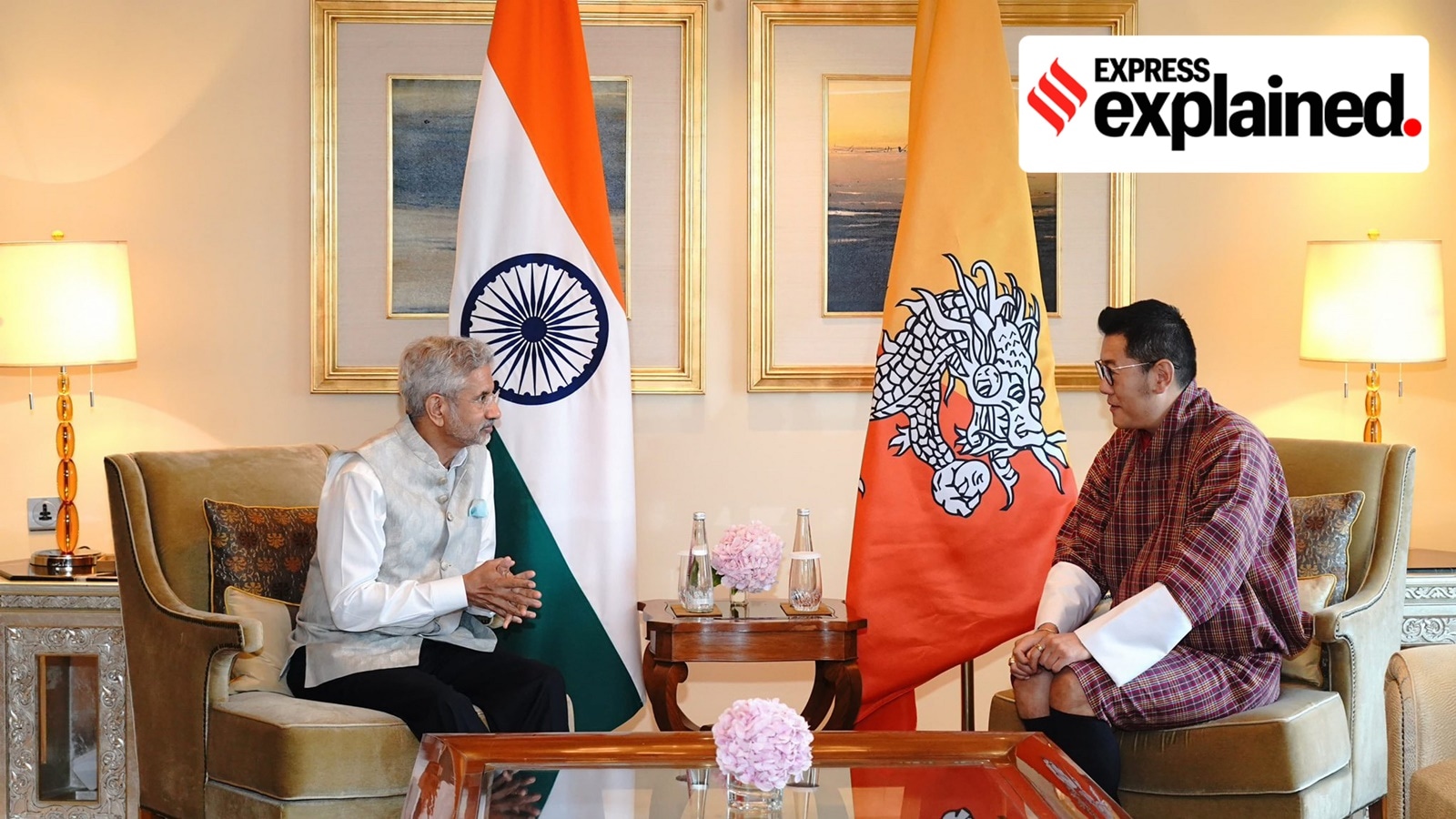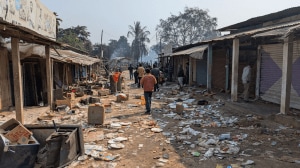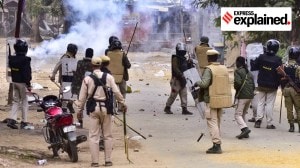Expert Explains | Bhutan’s King in India as Beijing-Thimpu speed up border talks: Why New Delhi is concerned
Bhutan has said its border talks with China are progressing well, and it wants to establish diplomatic relations with Beijing. Here's what this can mean for India.
 External Affairs Minister S Jaishankar during a meeting with King of Bhutan Jigme Khesar Namgyel Wangchuck, in New Delhi, Sunday, Nov. 5, 2023. (PTI Photo)
External Affairs Minister S Jaishankar during a meeting with King of Bhutan Jigme Khesar Namgyel Wangchuck, in New Delhi, Sunday, Nov. 5, 2023. (PTI Photo) The king of Bhutan, Jigme Khesar Namgyel Wangchuck, arrived in New Delhi on Sunday (November 5) to a red carpet welcome, with External Affairs Minister S Jaishankar receiving him at the airport.
The visit comes at a time Bhutan is engaged in crucial border talks with China, and the developments have led to some unease in New Delhi.
Last month, Bhutan and China held the 25th round of bilateral border talks in Beijing. Tandi Dorji, Bhutanese Foreign Minister who was in Beijing for the talks, made two declarations that startled India: Bhutan sincerely seeking a quick settlement of the border dispute, and establishing diplomatic relations with China at the earliest possible. Many experts point out that India has been caught unawares with this.
Prior to Dorji’s visit to Beijing — the first ever by a Bhutanese foreign minister — the nations’ attempts to settle the disputed border had proved futile. Also, this 25th round of talks was held after a gap of seven years. Crucially, this long hiatus had come after the Doklam standoff in the summer of 2017, when Indian and Chinese troops found themselves entangled in the remote yet sensitive Himalayan region where Bhutan, India (Sikkim) and China (the Tibet Autonomous Region) meet at a tri-junction. Apparently, it was the severity of the border conflict that led to the suspension of talks between Thimphu and Beijing. The talks were further “abandoned” amid the Covid-19 pandemic.
China’s calculations
“Shocked” and “alarmed” is how most experts in China had described Beijing’s reaction to the 73-day Doklam standoff (Donglang crisis, as Chinese call it). The Galwan clash of 2020 was apparently to avenge the Donglang crisis, and also to permanently dig in Chinese heels in the sensitive Himalayan region along the Line of Actual Control.
Also, China blames New Delhi for the failure of its border talks with Bhutan.
It is of relevance here to note that out of the 14 neighbouring countries China shares a land border with, only Bhutan and India continue to have a disputed boundary. As a Chinese scholar recently claimed, “India is not only obstructing any progress towards resolving border problems, but New Delhi has also been blocking diplomatic relations between Bhutan and China” (In Chinese sohu.com, April 2023).
However, what has now emerged is that the seven-year period was not all quiet, and Thimphu and Beijing maintained active engagement in this duration. In fact, a “three-step roadmap” (agreeing to the border “on the table”; then visiting the sites on the ground; and then formally demarcating the boundary) to take the talks forward was signed in 2021.
Bhutan’s gains
Among several diplomatic, economic, and political gains Bhutan is looking at by expediting normalising relations with China, the biggest is to be able to establish diplomatic ties with a P5 country.
The Himalayan kingdom is a unique UN member-country, having diplomatic relations with only 54 nations, which are mostly small, regional countries. Significantly, Bhutan does not enjoy diplomatic relations with all five permanent members of the UN Security Council.
Moreover, besides diplomatic missions in New York (UN), Brussels (EU) and Geneva, Bhutan has embassies only in India, Bangladesh, Belgium, Australia, Kuwait, and Thailand.
Analysts in China describe this unique international status of Bhutan as “self-isolation.” But Bhutan is now emitting very clear signals (to New Delhi) that it aspires to have a dynamic foreign policy.
India’s concerns
India’s most serious concern with regard to Bhutan normalising relations with China is strategic. Currently, India’s immediate worry is the prospect of Beijing forcing Thimphu to acquiesce to Chinese pressure and give away access or even control over the Doklam plateau. It is pertinent to pay attention to the speed with which China and Bhutan have made surprising success in their border settlement talks.
In mid-January this year, the two countries held a fresh round of border talks in the southwestern Chinese city of Kunming – bordering the northeastern Indian state Assam. The success of the talks was underscored in the joint statement insisting that a “positive consensus had been reached by both, and that they would both be increasing the frequency of their talks” (SCMP January 2023).
The Indian Express had reported the concerns in New Delhi after the Kunming talks. “India will monitor any move to take forward the China-Bhutan talks. It views Chinese presence near Doklam as a major security concern close to the strategic Siliguri corridor,” the report had said.
Scholars and analysts in China have begun celebrating Beijing’s success with Thimphu, calling it a “major diplomatic breakthrough” in South Asia. It is not hidden from anyone in New Delhi that China is eying a foothold in the Himalayan Kingdom to ultimately make a great leverage out of it in cornering India.
Hemant Adlakha teaches Chinese at the Jawaharlal Nehru University in New Delhi. He is also Vice Chairperson and Honorary Fellow, Institute of Chinese Studies (ICS), Delhi.
- 01
- 02
- 03
- 04
- 05






































